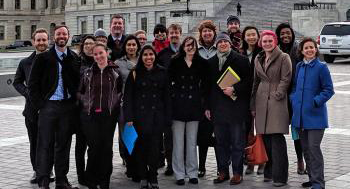Grad student part of US advocacy team to visit Capitol Hill

PHAS graduate student Jacob White was among the twenty-one American Astronomical Society (AAS) scientists who visited the US Capitol Hill on Wednesday, March 14 to advocate for robust US federal investment in astronomical sciences - as part of by the National Aeronautics and Space Administration (NASA), the National Science Foundation (NSF), and the Department of Energy (DOE) Office of Science.
Jacob applied in January to be part of this Congressional Visit Days (CVD) group, and was one of the selected fifteen people among ~150 applications received. Those selected were flown out to Washington DC for a 2-day workshop to learn about the basics of government funding/budget, cost breakdown of various US science agencies (e.g. NASA and NSF), and ways to engage and communicate with members of Congress about budgets. This workshops is followed by a full day of meetings with representatives from the White House budget office, lobbyists, directors of astrophysics in NASA and NSF, and more.
Why does this matter to science in Canada? The increased funding for the NSF would have an impact on Canadian astronomers that uses NSF funded facilities: the Atacama Large Millimeter Array (ALMA), the Very Large Array (VLA), and in particular the proposed ngVLA (next generation Very Large Array) that also has significant support from National Research Council of Canada.
In Jacob's case, his research is focused on observational signatures of planet formation through debris disks - or asteroid belts around other stars. Studying these debris discs can give us insight into the planet formation process, the architecture of planetary systems, and the dynamical history of planetary systems. He primarily uses radio telescopes like ALMA and the VLA mentioned above and is particularly excited about the future prospects of the ngVLA.
In addition, restoring the NASA education and outreach budget is extremely important as it is responsible for most of the "cool NASA stuff" that gets kids around the world (including those in Canada) interested in astronomy and science. There are also many scholarships funded through US science budget that Canadian students benefit from.
“Members of Congress, particularly those already engaged on science issues, value input from AAS staff and leadership as representative of the astronomical science community,” says Ashlee Wilkins, the AAS’s John Bahcall Public Policy Fellow. “But representatives and senators ultimately care most about what their constituents value. Face-to-face meetings between constituents and their members of Congress (or the members’ staff) can be quite powerful, and studies consistently show that such meetings are the most effective advocacy tool.”
Related Link:
- AAS Visits Capitol Hill to Advocate for Investment in Astronomy. March 29, 2018. American Astronomical Society.